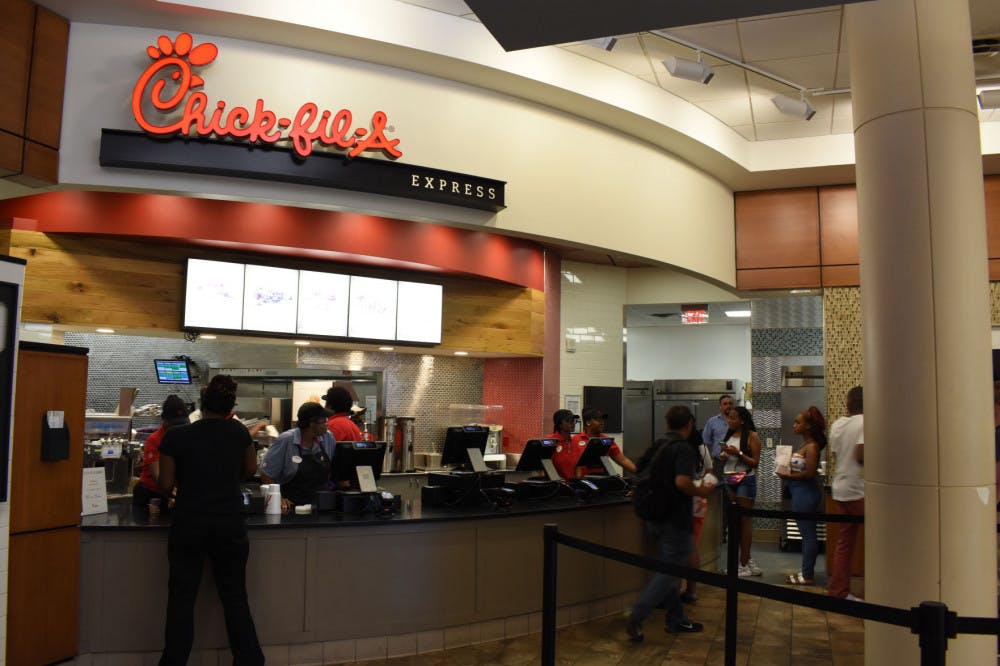The University of Memphis is no longer offering students an end of the semester refund for its mandatory meal plan as it replaces the Dining Dollars meal fund with its new Tiger Eat$ meal fund this semester.
Instead of getting a refund at the end of the semester, students will now have their money rolled over into the following semester. The remaining funds will still be nonrefundable at the end of the second semester.
Raaj Kurapati, chief financial officer at the UofM, said the change in policy was made to allow students to interact with one another by bringing a better dining service to campus.
“On-campus dining is an important part of campus life and we want students to stay engaged while they are on campus,” Kurapati said. “The Tiger Eat$ meal fund was developed to provide our resident and commuter students the opportunity to connect with friends on campus while providing healthy dining options.”
Kurapati said the refund policy was changed to put more money into campus projects to benefit students.
“As part of due diligence when looking at a new food service contract for the campus, we held several focus group sessions with students, faculty-staff and community members on what they were looking for in food service on campus,” Kurapati said. “The feedback was for there to be more options, including healthy choices, food trucks, local vendors and improvements in facilities. In order to fund the investments to make these choices available, we needed to make some policy changes.”
Kurapati said the goal for dining services is to provide good quality food on campus.
“Our goal is to provide a variety of healthy, diverse, and tasty food options to our students so they are able to use their Tiger Eat$ funds,” Kurapati said. “Tiger Eat$ averages $2.68 per day or $18.75 per week and can be spent at many locations on campus, including UofM Dining, Starbucks and some vending machines. Any remaining Tiger Eat$ balance from the fall semester will be transferred to the spring semester to give ample time for usage of the funds.”
Cecilia Fey, a UofM student, said she is not upset about the new policy with Tiger Eat$.
“If I am being honest, I spend all of my Dining Dollars (Tiger Eat$) anyways,” Fey said. “I am not really that upset about them being nonrefundable because I go through all of mine. However, for students who do not eat as much on campus, live at home or live somewhere else off-campus, then I just do not think that is fair to all of those students.”
Fey said she thinks Tiger Eat$ should be an optional program for students on campus instead of being a mandatory program.
“If the funds are nonrefundable, then there should be an option for students not to have these funds,” Fey said. “With our tuition, we automatically pay for these funds, so maybe they should change the system in that way.”
Adam Cole, a UofM student, said he was unaware the Tiger Eat$ meal fund was nonrefundable.
“I was unaware of the change until this week,” Cole said. “I had to be told by a professor.”
For some students, the money could be used for other purchases during the semester.
“I was not solely relying on it, but it was a pretty good bit of change and very useful to put toward something else,” Cole said. “I do not eat that much food on campus, so there is just no need for it.”
Cole said denying students a refund of their money at the end of a semester is a wrong decision on the school’s end.
“They tell us that the reason the whole thing exists is because people are not eating on campus, but there are not really any places I would consider eating,” Cole said. “If I am being completely honest, they could not get people to eat here because no one liked the food selection. They just need that money, not because people are not eating, but because they needed more to do stuff with.”
Kurapati said the Tiger Eats policy is expected to be the standard for many years.
Chartwells, the new University of Memphis food provider, expects to update the Chick-Fil-A to full service menu in spring 2020. UofM CFO Raaj Kurapati said to get some of these positive food changes, the University needed to update the mandatory dining charge policies.




